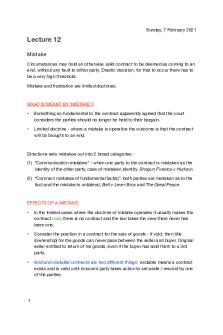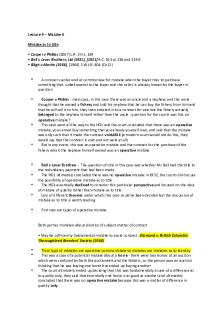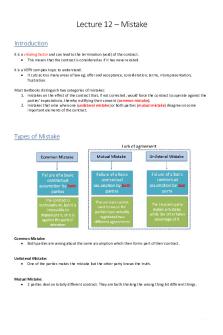Lecture notes, Mistake of Fact PDF

| Title | Lecture notes, Mistake of Fact |
|---|---|
| Course | Principles of Criminal Law A |
| Institution | James Cook University |
| Pages | 5 |
| File Size | 144.2 KB |
| File Type | |
| Total Downloads | 103 |
| Total Views | 134 |
Summary
-...
Description
Mistake of Fact One of the most important provisions of the Code Must be an honest and reasonable belief in the existence of any state of things Treats the accused as if the real state of things was as the accused believed At common law there are 2 categories of mistake of fact which may affect criminal responsibility 1. The first aspect of mistake of fact arises when a mistaken belief by the accused bears on the question of whether he or she possessed such a mental state 2. The common law defence of mistake – encompassed by s. 24 of the Code The first type of excusable mistake at common law is not expressly mentioned in the Code and the Crown must prove the existence of any specific intention defined as an element of any offence If a mistaken belief suggests that the accused did not possess such an intent, then the prosecution will fail Mistake of fact under the Code is an excuse, as distinct from a defence such as insanity, and is a matter which the Crown must negative BRD once the evidential onus has been discharged by the accused The mistake must be positively held, honest, reasonable and pertain to a state of things The mistake must be a reasonable one, such that an ordinary or reasonable person could make – must be objectively reasonable The evidentiary burden to raise a defence under s. 24 lies on the accused, although the persuasive burden rests with the Crown: Geraldton Fishermen’s Co-operative; McPherson v Cairn If there is evidence of an honest and reasonable but mistaken belief, the prosecution must negative the existence of the belief or its reasonableness BRD A successful claim under s. 24 will not always result in a complete acquittal. Section 24 only provides that the person who makes an honest and reasonable mistake is to be treated as if the facts had been as they were believed to be. This may sometimes mean that a person who makes a mistake still commits a lesser offence or is merely exposed to a lesser range of penalties
A mistake of fact is sometimes offered as explanation for breaching legal prohibitions. The claim is advanced that, if all had been as the accused believed, no beach would have occurred. The significance of such claims depends on the elements of the offence in issue and on the scope of certain special defences.
The Code incorporates a special defence of mistake of fact under s 24.
Mistakes and Subjective Mental Elements
Offences such as those involving the possession of drugs have a basic mental element built into the prescribed conduct elements. Other offences contain subjective fault elements such as intention/recklessness (i.e. murder or stealing.)
A mistake of fact may be inconsistent w/ these specific states of mind. A person who believes that a suitcase is empty does not ‘possess’ drugs that are found within it. A person who pulls the trigger of a gun, mistakenly believing it to be unloaded, does not have an intention to kill.
A person who picks up a mobile phone belonging to somebody else, mistakenly believing that it is his/her own, does not have an intention to deprive the owner of it. In such instances, it makes no difference whether the mistake is reasonable or unreasonable. In either case, the mistake is inconsistent w/ the state of mind which is required for the offence.
Mistakes, Accident and Negligence
For many offences against the person, the prosecution must either: 1. Defeat a defence of accident under the Code s 23(1)(b) by proving that the injury inflicted was foreseeable; or 2. Prove that there was a criminally negligent breach of one of the duty-imposing provisions in the Codes ss 285-290.
An objectively reasonable mistake may be inconsistent w/ the assertion that injury was foreseeable or that there was criminal negligence. For example, if there was a reasonable belief that a gun was unloaded, it would not be foreseeable that pulling the trigger would cause injury to anyone. Moreover, pulling the trigger may not be a criminally negligent act.
Ordinarily, unreasonable mistakes will be immaterial in relation to liability for offences subject to these provisions, though a mistake that is unreasonable may not be so wildly unreasonable as to amount to criminal negligence. For criminal negligence, the mistake must be grossly negligent.
It is possible, although unlikely for a charge of criminal negligence to fail b/c an honest albeit unreasonable mistake was made. In Pacino v R, the court failed to distinguish b/w the different standards in issue for criminal negligence and for the special defence of mistake of fact under s 24.
A reasonable mistake of fact may also be inconsistent w/ any other form of negligence prescribed as an element of an offence. For example, the offence of receiving under the Code s 433(1) requires the person to have had ‘reason to believe’ that the property was ‘tainted’. There would be no reason to so believe if there was a reasonably held mistaken belief that the property had been acquired lawfully.
Mistake of Fact – Criminal Code s 24(1) A person who does or omits to do an act under an honest and reasonable, but mistaken, belief in the existence of any state of things is not criminally responsible for the act or omission to any greater extent than if the real state of things had been such as the person believed to exist. (2) The operation of this rule may be excluded by the express or implied provisions of the law relating to the subject.
Where a MoF cannot be addressed in any other way a defence may be provided by s 24.
This provision establishes the test for excusing criminal responsibility in relation to several serious offences (such as mistaken beliefs in consent to sexual interaction or mistaken beliefs about substances that are in fact illegal drugs.
s 24 also establishes the test for criminal responsibility in relation to a host of minor offences in governmental regulatory schemes.
The evidentiary burden to raise a defence under s 24 lies on the accused, although the prosecution carries the persuasive burden to defeat the defence when it is in issue: McPherson v Cairn.
There are two elements about which the evidentiary burden must be discharged. The accused must positively hold an honest belief in the evidence of a state of things and that belief must be objectively reasonable.
If there is evidence of an honest and reasonable but mistaken belief, the prosecution must negative the existence of the belief or its reasonableness beyond reasonable doubt.
A successful MoF claim under s 24 will not always result in a complete acquittal as the provision only provides that the person who makes the honest and reasonable mistake is to be treated as if the facts had been as they were believed to be. This may mean that a person who makes a mistake still commits a less serious offence or is perhaps exposed to a lesser range of penalties.
If someone possesses a prohibited substance specified in a category attracting a high scale of penalties, reasonably believing that the substance is one which would fall w/in a different category attracting a lower scale of penalties, the effect of s 24 may be that the lower scale of penalties applies.
A defence under s 24 is available only where the mistake was an objectively reasonable one. This requirement has produced a dramatic divergence b/w the law on mistaken belief in consent to sexual interaction in the code jurisdictions and in the common law jurisdictions.
Common law jurisdictions but not code jurisdictions will permit a defence of mistake in circumstances where the belief is unreasonable: A-G Ref No 1 of 1977.
The divergence is narrowed by the QCA decision in R v Mrzljak and the WACA decision in Aubertin v State of WA. In these cases, it was insisted that the issue under s 24 is whether the accused’s own belief was reasonable and this is a different issue from whether a reasonable would have formed the same belief.
The above rulings are significant in two ways; first, they have made the test adaptable for the mental capacity of the accused. Individual limitations/impairments (including certain factors such as intoxication) can be taken into account in determining what might have been reasonable.
These rulings are also significant b/c they allow for the possibility that various beliefs about some matter might each be reasonable. In R v Wilson, the QCA quashed a conviction of dangerous driving in a case where the appellant’s defence had been that his failure to notice an oncoming motorcycle involved a reasonable mistake of fact. The TJ had directed the jury that the reasonableness of the accused’s belief was to be determined by reference to the standards of ‘an ordinary, reasonable person in the appellant’s position’. There was no issue of impaired capacity. Nevertheless, it was held that the wrong test had been used
b/c it did not focus on the reasonableness of the appellant’s own belief. Fraser JA said: ‘in my opinion the vice in this direction was that it denied the possibility that different people in the appellant’s position might have held differing beliefs, each of which was nevertheless a reasonable belief.
An unreasonable mistake is a negligent mistake. Thus, offences to which s 24 may apply can be committed negligently. The restrictive wording of s 24, however, also allows some persons to be convicted who were not negligent. Unless a mistake is made, it is immaterial that reasonable care or due diligence may have been exercised to prevent the offence occurring, see G J Coles & Coy Ltd v Goldsworth.
The above case also held s 24 to require a ‘positive’ belief. This seems to exclude any state of mere inadvertence or ignorance no matter how reasonable the state of mind might be. If this view is correct, the s 24 would be available to a person who possesses a prohibited drug honestly and reasonably believing that it is aspirin, but not to a person who possesses a prohibited drug having no idea what the substance is, but quite reasonably, never contemplating the possibility that it might be a prohibited drug.
It is difficult to see why such a sharp distinction should be made b/w mistake and ignorance. However, the same distinction is drawn at common law in Australia, see State Rail Authority of NSW v Hunter Water Board.
The phrase ‘belief in the existence of any state of things’ in s 24 has sometimes been said to cover only matters of present fact and to exclude any belief about the consequences or potential consequences of acts.
In Gould & Barnes, it was said that the defence would be available for a mistaken belief about the contents of a bottle, or about the chemical properties of the contents, but not for a mistaken belief that a particular usage of the contents would be safe: at 297-298. The question should be regarded at still open, however.
Gould & Barnes can be contrasted w/ Pacino, where a mistaken belief that some dogs were not dangerous was treated as a mistake about ‘a state of things’. In any event, criminal responsibility for unintentionally causing death/serious injury may sometimes be negatives in ways other than through recourse to s 24 – in Pacino, the alleged mistake was relevant to whether there had been criminal negligence. – In Queensland, a restriction on s 24 could be important in cases of self-defence and other uses of defensive force. The first paragraph of Code s 271 requires that the force used be ‘reasonably necessary for self-defence (see also ss 274-278) on defence of property.
There is a question whether mistakes about the necessity to use the force can fall w/in s 24, with a negative answer given by some judges in Marwey v R. s 24(2) allows for the exclusion of the defence of reasonable mistake by either express or implied provisions. An example of an express exclusion is found in the Code s 229, which govern certain offences involving sexual interaction w/ children and young persons. The provision makes it immaterial, except as otherwise stated, that the accused believed that the other person was not under the prescribed age. When the provision applies, it would be irrelevant that the mistaken belief about the age of the person was reasonable. The draconian features of this provision are moderated by several provisions that allow a defence of reasonable mistake in some circumstances involving offences against children: Code ss 210(5), 215(5), however, these provisions are less advantageous to an accused
than s 24 b/c they place a persuasive burden of proof, not an evidentiary onus, on the accused. An example of an implied exclusion of s 24 is McPherson v Cairn, which concerned an offence relating to the operation of a commercial vehicle outside the terms of a licence. It was held that the express provision of a defence of mistake for the driver impliedly excluded any defence for the owner. ‘Implied exclusions’ must, however, be necessarily implied by the text/context of the offence description. In contrast, at common law, the exclusion of a defence of mistake has sometimes been justified on the basis of ‘the subject matter’ of the offence. The courts have rejected such an approach in relation to Codes s 24: Geraldton Fishermen’s Cooperative v Munro....
Similar Free PDFs

Lecture notes, Mistake of Fact
- 5 Pages

MISTAKE OF LAW VS MISTAKE OF FACT
- 14 Pages

Mistake - Lecture notes 3
- 3 Pages

(12) Mistake - Lecture notes 12
- 8 Pages

Lecture 9 - Mistake II
- 7 Pages

Mistake - exam notes
- 7 Pages

Mistake
- 4 Pages

3.0 Case Notes on Mistake
- 29 Pages

2. Cross-purpose mistake notes
- 2 Pages

Mistake Tutorial
- 4 Pages
Popular Institutions
- Tinajero National High School - Annex
- Politeknik Caltex Riau
- Yokohama City University
- SGT University
- University of Al-Qadisiyah
- Divine Word College of Vigan
- Techniek College Rotterdam
- Universidade de Santiago
- Universiti Teknologi MARA Cawangan Johor Kampus Pasir Gudang
- Poltekkes Kemenkes Yogyakarta
- Baguio City National High School
- Colegio san marcos
- preparatoria uno
- Centro de Bachillerato Tecnológico Industrial y de Servicios No. 107
- Dalian Maritime University
- Quang Trung Secondary School
- Colegio Tecnológico en Informática
- Corporación Regional de Educación Superior
- Grupo CEDVA
- Dar Al Uloom University
- Centro de Estudios Preuniversitarios de la Universidad Nacional de Ingeniería
- 上智大学
- Aakash International School, Nuna Majara
- San Felipe Neri Catholic School
- Kang Chiao International School - New Taipei City
- Misamis Occidental National High School
- Institución Educativa Escuela Normal Juan Ladrilleros
- Kolehiyo ng Pantukan
- Batanes State College
- Instituto Continental
- Sekolah Menengah Kejuruan Kesehatan Kaltara (Tarakan)
- Colegio de La Inmaculada Concepcion - Cebu





